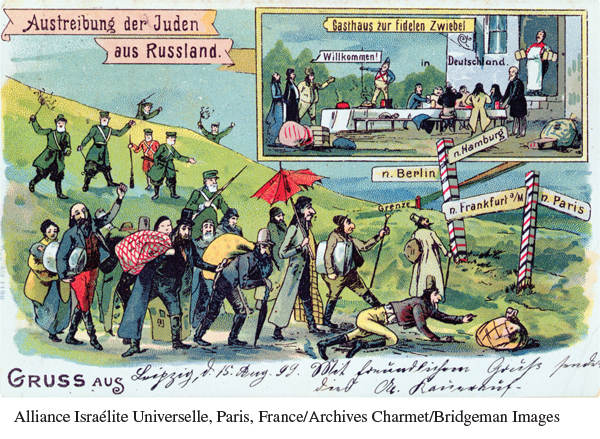Jewish Emancipation and Modern Anti-Semitism
Changing political principles and the triumph of the nation-state had revolutionized Jewish life in western and central Europe. The decisive turning point came in 1848, when Jews formed part of the revolutionary vanguard in Vienna and Berlin and the Frankfurt Assembly endorsed full rights for German Jews. In 1871 the constitution of the new German Empire consolidated the process of Jewish emancipation in that nation. It abolished all restrictions on Jewish marriage, choice of occupation, place of residence, and property ownership. However, even with this change, exclusion from government employment and discrimination in social relations remained.
The trend toward legal emancipation presented Jews with challenges and opportunities. Traditional Jewish occupations, such as court financial agent, village moneylender, and peddler, were undermined by free-market reforms, but careers in business, the professions, and the arts opened. European Jews excelled in wholesale and retail trade, banking and finance, consumer industries, journalism, medicine, and law, as well as the fine arts. By 1871 a majority of Jewish people in western and central Europe had improved their economic situation enough to enter the middle classes. Middle-class Jews came to identify strongly with their respective nation-states and, with good reason, saw themselves as patriotic citizens.
Vicious anti-Semitism reappeared with force in central and eastern Europe after the stock market crash of 1873. Drawing on long traditions of religious intolerance, segregation into ghettos, and periodic anti-Jewish riots and expulsions (or pogroms), late-nineteenth-century anti-Semitism now drew on the exclusionary aspects of modern popular nationalism and the pseudoscience of race. Fanatic anti-Semites whipped up resentment against Jewish achievement and Jewish “financial control” and claimed that the Jewish race or “blood” (beyond the Jewish religion) posed a biological threat to Christian peoples. Such ideas were popularized by the repeated publication of the notorious forgery “The Protocols of the Elders of Zion,” a falsified account of a secret meeting supposedly held at the First Zionist Congress in Basel in 1897. The “Protocols,” actually written by the Russian secret police, suggested that Jewish elders planned to dominate the globe. Such anti-Semitic beliefs were particularly popular among conservatives, extreme nationalists, and people who felt threatened by Jewish competition, such as small shopkeepers, officeworkers, and professionals.
Anti-Semites created nationalist political parties that attacked and insulted Jews to win popular support. Anti-Semitism helped Karl Lueger and his Christian Socialist Party, for example, win striking electoral victories in Vienna in the 1890s. Lueger, mayor of Vienna from 1897 to 1910, combined fierce anti-Semitic rhetoric with municipal ownership of basic services, and he appealed especially to the German-speaking lower middle class — and an unsuccessful young artist named Adolf Hitler.
Before 1914 anti-Semitism was most oppressive in eastern Europe, where Jews suffered from social prejudice and rampant poverty. In the western borderlands of the Russian Empire, where 4 million of Europe’s 7 million Jewish people lived in 1880 with few legal rights, officials used anti-Semitism to channel popular discontent away from the government and onto the Jewish minority. Russian Jews were regularly denounced as foreign exploiters who corrupted national traditions, and in 1881 to 1882 a wave of violent pogroms commenced in southern Russia. The police and the army stood aside for days while peasants looted and destroyed Jewish property, and official harassment continued in the following decades.

“The Expulsion of the Jews from Russia” So reads this postcard, correctly suggesting that Russian government officials often encouraged the popular anti-Semitism that helped drive many Jews out of Russia in the late nineteenth century. The road signs indicate that these poor Jews are crossing into Germany, where they will find a grudging welcome and a meager meal at the Jolly Onion Inn. Other Jews from eastern Europe settled in France and Britain, thereby creating small but significant Jewish populations in both of these countries for the first time since they had expelled most of their Jews in the Middle Ages.
(Alliance Israélite Universelle, Paris, France/Archives Charmet/Bridgeman Images)
The growth of radical anti-Semitism spurred the emergence of Zionism, a Jewish political movement whose adherents believed that Christian Europeans would never overcome their anti-Semitic hatred. To escape the burdens of anti-Semitism, leading Zionists such as Theodor Herzl advocated the creation of a Jewish state in Palestine — a homeland where European Jews could settle and live free of social oppression. (See “Individuals in Society: Theodor Herzl.”) Zionism was particularly popular among Jews living in Russia. Many embraced self-emancipation and the vision of a Zionist settlement in Palestine, or emigrated to western or central Europe and the United States. About 2.75 million Jews left central and eastern Europe between 1881 and 1914.
